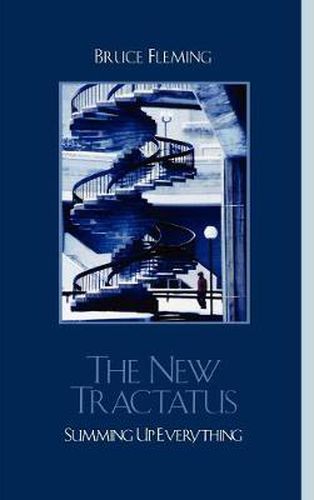Readings Newsletter
Become a Readings Member to make your shopping experience even easier.
Sign in or sign up for free!
You’re not far away from qualifying for FREE standard shipping within Australia
You’ve qualified for FREE standard shipping within Australia
The cart is loading…






Ludwig Wittgenstein’s Tractatus Logico-Philosophicus was informed by the belief that it was possible to get clarity once and for all on fundamental philosophical issues, and so to think our way to a silence where philosophy was no longer necessary. This is The New Tractatus: it sympathizes with Wittgenstein’s impatience with the endless cycle of argument, but reacts to this impatience and takes it in different directions than Wittgenstein did. Wittgenstein was concerned with questions like these: What is the meaning of language? What is our relationship to the universe? What is the nature of philosophy? These questions are covered in The New Tractatus, along with many other topics, such as: Why is sex a controversial issue? Why are we so interested in celebrities? What is the nature of love? Why do liberals and conservatives argue about so many things? What is magic? Can miracles occur? Is science objective? Does art lie to us? How do we win arguments? What is the meaning of life? What The New Tractatus shares with the old is the fundamental perception that we can never transcend what is. The world is all that is the case: whatever comes to be is part of the world.
$9.00 standard shipping within Australia
FREE standard shipping within Australia for orders over $100.00
Express & International shipping calculated at checkout
Ludwig Wittgenstein’s Tractatus Logico-Philosophicus was informed by the belief that it was possible to get clarity once and for all on fundamental philosophical issues, and so to think our way to a silence where philosophy was no longer necessary. This is The New Tractatus: it sympathizes with Wittgenstein’s impatience with the endless cycle of argument, but reacts to this impatience and takes it in different directions than Wittgenstein did. Wittgenstein was concerned with questions like these: What is the meaning of language? What is our relationship to the universe? What is the nature of philosophy? These questions are covered in The New Tractatus, along with many other topics, such as: Why is sex a controversial issue? Why are we so interested in celebrities? What is the nature of love? Why do liberals and conservatives argue about so many things? What is magic? Can miracles occur? Is science objective? Does art lie to us? How do we win arguments? What is the meaning of life? What The New Tractatus shares with the old is the fundamental perception that we can never transcend what is. The world is all that is the case: whatever comes to be is part of the world.